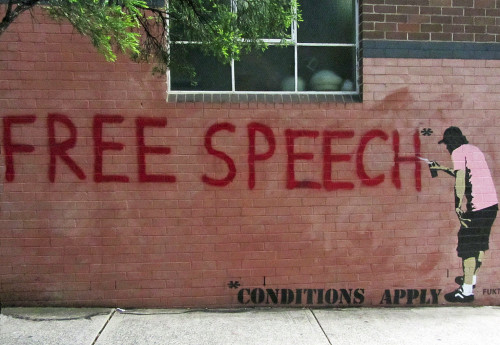– but with any more fake ‘press freedom’ it could happen in broad daylight.
The Washington Post began patting itself on the back for a job well done three days before World Press Freedom Day on Monday, ‘flooding the zone’ as if narcissistic praise could stand in for ‘just following orders’-type fascism.
Rather than do the serious research required to back up these controversies, the Post and its ilk would rather just ask the CIA – they wouldn’t lie to us! Never mind that Amazon’s web servers are quietly pouring millions of American taxpayer dollars into Amazon’s pockets; conflicts of interest are so common the mainstream outlets seem to prefer to ignore them. This situation should nauseate anyone who’s paying attention, but instead it barely rings a bell in an era where corporate sponsorship is all but mandatory to have one’s message heard.
One might think such bragging is distasteful, grotesque even, but the Post is far from the only entity to sacrifice reality for fluffing up its credibility, but never mind that the quality of the reporting ever since Amazon founder Jeff Bezos snatched up the venerable news name for just $250 million has declined. Journalism isn’t exactly a money-making business, and for those who are eager to get in on the press freedom action, one can hardly tell if another knows you’re a big fan of the First Amendment unless you’re broadcasting it across your back in giant-size letters. And if you are? They'll have to call you back another day...
WaPo and its cohort’s sloganeering haven’t just knocked their own credibility loose – they’ve inspired a renewed wave of derision against the broader American media, which is already sinking, given the sociopolitical climate in which the Post, along with its media fellow-travelers, find themselves acting as the country’s official censors-in-chief. It’s a lamentable fall from grace for venerable outlets that once risked their freedom by breaking shocking and disturbing stories critical of the US’ sordid misdeeds in Vietnam, Cambodia, and Laos. Now, such journalism is scorned as so-called “conspiracy theory”, no matter how much truth lies within.
Apparently, WaPo thought they could get the drop on the sarcastic loathing traditionally leveled at the outlet with every press-freedom holiday by sarcastically smirking issuing their statement of support early on. Rather than drop all of its ads promoting Our Democracy™ on Monday, World Press Freedom Day, the news outlet began tweeting about the importance of press freedom all the way back on Friday – as if trying to cash in on some sort of epistemological Black Friday sale. That meant doubling down on Russiagate (including its fabulous new spinoff, the “Russian Bounty” saga – get your copy before they finally yank it from the website as too large an embarrassment even for the grand embarrassment machine!) and other screeching falsehoods undercover of being misled by “anonymous sources.” All under the banner of the bromide that splashed across the top of every edition of the Bezos Post: Democracy Dies in Darkness.
Because it’s not like WaPo is the only outlet to be ensnared in such foolishness. Thanks to the incestuous nature of American media, a lie printed in one paper is likely to resurface in another hours later, and if it lands in Wikipedia, dozens of outlets will be re-chirping it before the day is over.
Ironically, the press-freedom ‘offenders’ love this sort of freedom – a “freedom to infect” that as often as not leaves the entire US news media believing some bizarre theory or another. And this wouldn’t even be a problem, if all viewpoints were treated equally. But instead, the wrong ideas get all the ink and airtime and the right ones are muzzled and pepper-sprayed if they get out of line. The problem isn’t just the WaPo.
Even Glenn Greenwald, who released (or attempted to release) NSA whistleblower Edward Snowden’s massive troves of scandalous information detailing the extent to which American intelligence was spying on Americans and their so-called allies. Those documents, and the journalists tasked with revealing them to the world – himself included – were all but gag-ordered, put under corporate lock and key by billionaire eBay and PayPal co-founder Pierre Omidyar and his Bezos-rivaling stacks of cash. One can only wonder at Snowden’s choice of journalists, who allowed themselves to be silenced and the material Snowden risked so much to expose, now locked away in a digital safe somewhere. Omidyar’s Intercept has become something of a black hole for journalists carrying sensitive information, with three whistleblowers sent to rot in jail thanks to their poor choice of confidante – and this is what passes for “alternative media” these days.
Had Snowden knocked at the door of the Post, he’d likely have been turned away – or worse, turned in – immediately. Rather than welcoming whistleblowers into their newsrooms, the media establishment all but cheers on their imprisonment, as it has done with Wikileaks publisher Julian Assange and former US military analyst Chelsea Manning, both of whom have been hounded relentlessly by the US government and baselessly accused by the Pentagon of putting innocent civilians in danger for exposing war crimes in Iraq and Afghanistan.
But just as picking the lesser of two evils for president should not be the status quo, that same doomsday decision should be nowhere near one’s media diet. Too many journalists are out there making great work, only to have it memory-holed or deleted outright amidst the Outrage du Jour, and too many others take the path of “playing it safe” in hopes of not running afoul of the censors – until they, too, are knocked offline. There is no way to placate the kind of ghouls who run around misdiagnosing their censorship as “press freedom.” True freedom allows audiences to choose for themselves what they want to see, not what’s buried beneath a pile of smoldering disclaimers as WaPo and its pals so often find themselves. Let’s keep it that way.





